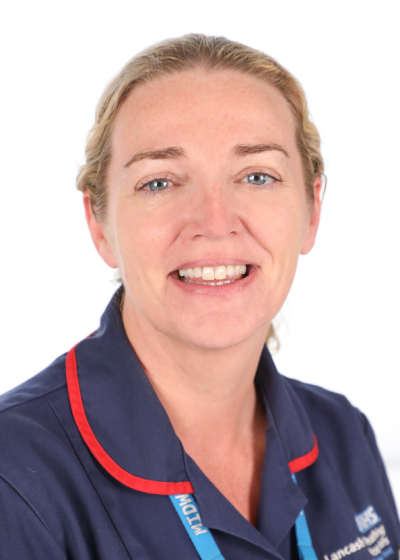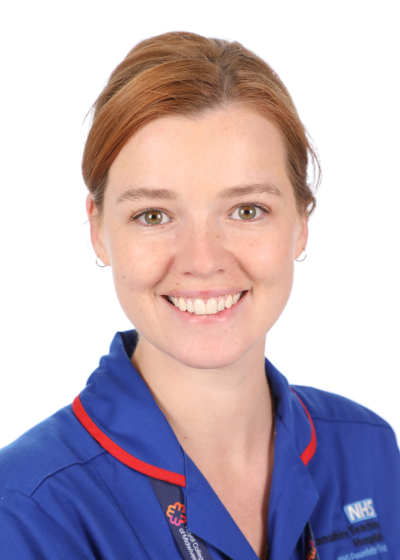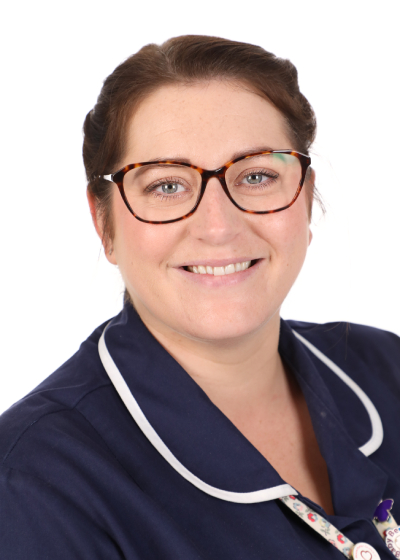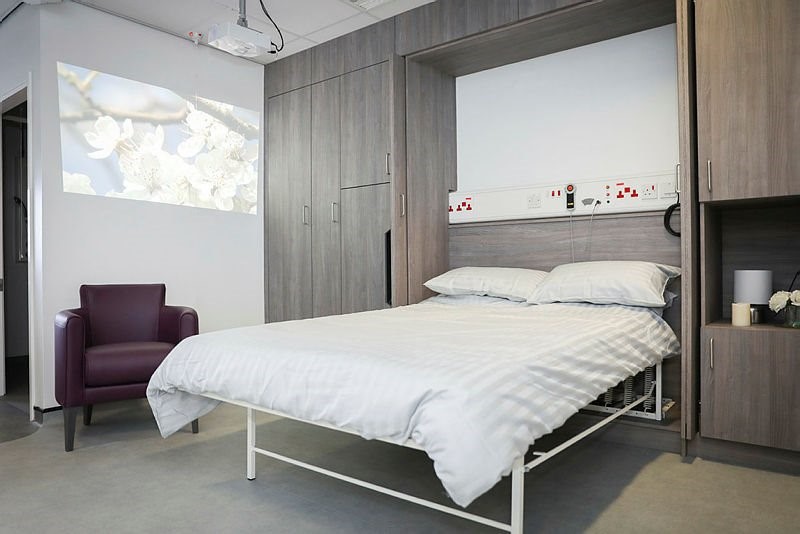Pregnancy and giving birth to a baby is generally safer now than ever before, but unfortunately, it does not always have the happy ending that has been planned and hoped for. This can be a very sad and distressing time for families who are faced with the unexpected loss of their baby. Lancashire Teaching Hospitals recognise the huge impact that this has on women and their families, and while we can’t take away the pain of loss, we endeavor to support our families as much as we can.
We have a dedicated team of bereavement midwives able to help at this very difficult time.

Claire Braithwaite
Lead Bereavement Midwife

Pippa Tinker
Bereavement Midwife

Lauren Dawson
Bereavement Midwife

Beth Wright
Bereavement Nurse
- Bereavement Care
Our Bereavement Team is an essential point of contact for families during this difficult, painful and emotional time. They provide a compassionate link between you and bereavement services, including supporting you and your family, helping to organise funerals, register deaths, and explain any results and investigations as to why your baby has died. For many families, creating memories of their baby and spending time with them is an integral part of their care in their journey. However, this is a very personal choice, there are no rights or wrongs, and our care will reflect individual wishes.
- Butterfly Suite
We have a special bereavement room for you and your loved ones to stay in during your time in hospital called the ‘Butterfly Suite’. This is located on the delivery suite and is a calm place for you to make special memories and spend time with your baby at this very difficult time. Some families will choose to spend a short time in hospital with their baby whereas others may wish to spend longer. Partners are supported to stay and your close family and friends are welcome. We have a cuddle cot set up in the Butterfly Suite, which enables you to spend as much time as you wish with your baby.

- Memory Box
We can offer you a special memory box for your baby, kindly donated by the charity 4Louis. Memory boxes can help capture the time you had with your baby. The box is a special place for keepsakes to remember your baby by. This could include a scan picture, photographs, hand and footprints, a lock of hair or any cards that you might receive.
- Memorial Book/Tree
There is a special book of remembrance in our Butterfly Suite for you and your family to write a message in for your baby. We also have a memorial tree which was kindly donated by one of our bereaved parents, please feel free to write a tag in memory of your baby and hang from the tree.
- Seeing and Holding Your Baby
Many parents feel it is very important to see and hold their baby regardless of their size, condition or the stage at which they died. Some parents may find this frightening and feel anxious about it, but our lovely midwives will be here to support you. For many parents, the time they spend with their baby becomes very precious memories in the months and years afterwards.
- Hand and Footprints
If you’d like, we will take ink prints of your baby’s hands and feet. You may choose to incorporate the prints into images, tattoos and jewellery. You may want a few sets of these prints to give to family members who are not able to meet your baby.
- Photographs
You may wish to take photos of your baby on your phone, some parents like to have photographs of their baby’s hands and feet, others may also wish to have a photo of them holding their baby. We can offer professional photography from our hospital Medical Illustration team that will take lovely photographs of your baby and family photos for you to keep. The bereavement team will collect your photos when they are ready and give you them when they visit you.
- Hospice care and taking your baby home
In certain circumstances, local hospices such as Derian House can provide support you and your family. They have bereavement suites where you can take your baby and stay with them for a few days.
It is also an option for you to take your baby home or to a special place of your choice. Some families have chosen to take their baby home or outside of the hospital for a walk in a pram to make more special memories with their baby. If this is something you would like to do, please inform your midwife, and we can facilitate this for you.
- Spiritual support
The hospital Chaplaincy Service includes representatives from all faiths and they are here to support families in any way that they need. The team is committed to listening to parents and you don’t have to be religious to talk to a member of the team. Many parents have found it useful to help them through this difficult time.
All chaplains can be contacted, through ward staff, via the Switchboard.
- Registration
In England and Wales, all stillbirths (after the 24th week of pregnancy) and neonatal deaths are required by law to be registered by the Registrar. The Bereavement team will collect the required documentation and will liaise with the Registrars to make arrangements for the registration. We will then speak to you about the date and time of your registration appointment.
- Lactation after Loss
Some mums and lactating parents find producing breastmilk very painful as it reminds them of their loss and they want to stop their milk production as quickly as possible. Others find making and expressing their milk comforting. There is no right or wrong way to feel, or decision to make. The amount of milk produced in the breast will vary from person to person and will reduce naturally over a period. If breastfeeding has already been established, your breasts may continue to produce milk for some time.
It is important not to abruptly stop milk production if breastfeeding has been established, as this may increase the risk of severe breast engorgement and mastitis.
Engorgement
Engorgement is when the breasts become swollen, firm, and painful. It can happen between 2-5 days after the loss of your baby. Your breasts can leak milk and feel uncomfortable for up to 7-14 days. This can settle on its own. If severely engorged, your breasts can become hard, shiny, warm, and slightly lumpy to touch.
Relieving Symptoms of Engorgement
There are a variety of methods that can be used to reduce milk production including prescribed medication and a milk reduction routine. These are a few suggestions to help relieve engorgement.
- Take regular pain relief.
- Wear a support bra e.g. a sports bra day and night.
- Use breast pads to absorb leaking milk.
- Use cold compresses for 15-20 minutes – avoid heat.
- If your breasts feel very full, hand express a small amount off for comfort.
- Have a warm bath or shower to allow the breasts to leak naturally (ensure shower water jets are not directly on the breasts)
- Sleep on your back.
Mastitis
Mastitis is inflammation of the breast, which, if left untreated, can develop into a more serious infection. Symptoms include:
- red, swollen area on the breast that is hot and painful to touch.
- breast lump or area of hardness on the breast
- white or blood-stained nipple discharge
- flu-like symptoms including fatigue, chills, fever.
If you display any of these symptoms, it is important to contact your midwife, health visitor or GP as antibiotic treatment may be required.
Reducing Your Milk Supply
If you were expressing regularly for a premature or ill baby, you will need to gradually reduce the amount of breast milk produced. This can be done through increasing the time between hand expressing, over a few days and eventually coming to a stop. If you are unable to find relief using hand expressing a pump can be used, however only spend as long on the pump as it takes to reduce the pressure in your breasts; emptying your breasts will encourage your body to produce more milk.
Donating Your Milk
If breastmilk donation is something you are considering – please ask your midwife for more information. The Milk Bank at Chester has lots of advice and information on milk donation.
- Baby loss certificate (<24 weeks gestation)
A recent Government scheme designed to recognise the grief of parents who have experienced a loss of pregnancy before 24 weeks has been launched. The scheme offers those who experience a loss pre-24 weeks' gestation a certificate to formally recognise the devastating impact of pregnancy loss and acknowledge their baby.
https://www.gov.uk/request-baby-loss-certificate
If your pregnancy ended before 24 weeks, you can get a certificate in memory of your baby. Its free of charge.
You do not need to request a certificate if you prefer not to. It’s optional.
You can ask for a certificate if all these apply:
- you’ve lost a baby before the 24th week of pregnancy
- you’re one of the baby’s parents or surrogate
- you’re at least 16 years old
- your pregnancy ended on or after 1 September 2018
- you lived in England when you lost your baby
- you live in England
If you’ve lost more than one pregnancy, you can apply separately to get a certificate for each baby loss. Your certificate should arrive in the post within 14 days. If you do not receive it, you can request another certificate.
- Investigations
When your baby dies, it can feel very important to understand why. Sometimes the cause of death is clearly related to a medical condition in mother or baby. For many babies, the cause is not clear straight away and investigations can help to understand what happened. Sadly, in some cases, even after full investigations the cause of death may remain unclear.
- Post-Mortem
A post mortem (also called an autopsy or PM) is the medical examination to help understand any factors that might have contributed to a baby’s death. Unless it has been ordered by a coroner, a post mortem examination cannot be done without parental consent. More information about the types of PMs and the process will be given to you by the bereavement midwife/doctor when going through the consent form.
Why are post-mortems carried out?
PMs are usually carried out to find out exactly how or why a baby died. Sometimes families ask questions that can only be answered with information from a post mortem examination.
They help to:
- Identify the cause of death
- Confirm the nature/extent of an illness
- Identify other conditions that may not have been diagnosed
- Assess the effects of treatments and drugs and identify any complications or side-effects
- Help plan future pregnancies and care during pregnancy
In very small babies, a PM can be less successful. In these babies, the examination is successful in 3-5 out of 20 babies.
Who performs the examination?
PMs are carried out by pathologists – doctors who specialise in the diagnosis of disease and identifying causes of death. The pathologist is helped by other staff, usually at least one mortuary technician.
Where/when is the PM carried out?
Post-mortems for babies born at LTHTR are carried out in RMCH (Royal Manchester Children's Hospital).
The PM will be carried out as soon as possible, usually within two to three days of death because the earlier the examination is held, the more likely it is to provide usually and accurate information.
The examination itself may take several hours/days or even weeks. Babies from LTHTR usually attend RMCH withing 48 hours of arranging and transferred back to Preston within 7 days. But this can vary on service demand in Manchester.
Can my baby be seen after post-mortem?
After the PM, the mortuary staff will prepare your baby as they had arrived. Dressed and wrapped in the same way for family to see and hold again if you wish. The appearance of your baby may have changed following the PM, so its important to discuss this with the funeral director to know what to expect.
How do we get the results?
After the tests are complete, a copy of the report will be sent to the bereavement midwife who will notify you that the results are back.
Reports can take on average 4/5 months to come back to the Trust. The bereavement midwife will arrange a follow up meeting with you to discuss the findings of the PM. The meeting will include the bereavement midwife, lead obstetrician and or a neonatologist. A copy of the reports will be given to you.
- Histology and Genetics
We can also offer placental histology testing that can provide us with more information about the cause of death. Your placenta gets sent to RMCH where a pathologist will examine the placenta. These results can take up to 4 months to come back to LTHTR.
We can offer genetic testing also, where a small cord sample gets sent to Liverpool Womens Hospital and tested to investigate the genetic make-up of your baby. These results can take up to 8 weeks to come back to LTHTR. Genetic testing may be especially useful if your baby had a condition relating to how cells in his or her body were formed or if the doctors think that you or your partner carry a genetic disorder. Depending on when your baby died, genetic testing may also be able to confirm your baby's gender.
- Follow up
You will be invited back to the hospital for an appointment with the consultant to go over the events of your pregnancy, receive support and discuss results from investigations and post-mortem results if you have consented to one. Depending on the types of investigations performed, sometimes the appointments can be up to 12 weeks after admission to the hospital. Often these appointments are emotional for you, and a member of the bereavement team will attend these appointments to give you extra support. This is a useful opportunity for you to ask questions so make sure that you write down any questions you have, as sometimes they may be forgotten during the consultation. This may also be a time to think about the future and make plans for support in future pregnancies.
- Baby loss awareness week
Attending remembrance events can be a meaningful way of honouring your baby’s memory and a helpful part of your grief journey. Sharing this time with other families might help you feel less isolated in your grief.
Baby Loss Awareness Week is held every year between 9-15th October and ends with an international wave of light at 7pm on 15 October for parents to remember their baby at the same time as others across the world.
Preston and Chorley hospitals together hold a memorial service every year that your bereavement midwife will invite you to – this usually involves a Chapel service followed by the Wave of Light at 7pm and a memorial walk in a local area.
Service of Reflection and Remembrance
You and your family are invited to a Service of Remembrance, for all those who have experienced the loss of a baby through pregnancy, miscarriage, stillbirth or neonatal death
Tuesday 15th October 2024 6pm for a 6:30pm start At St Cuthberts Church, Fulwood (PR2 3AR) Light refreshments to follow
Numbers are limited so please let us know if you would like to attend visit
https://www.trybooking.com/uk/DWEB
Any questions please email lynne.graysmark@lthtr.nhs.uk
If you would like to find out more about the other ways we are honouring Baby Loss Awareness Week, please visit www.babybeat.org.uk
Baby Beat raises funds to help the babies and families who are cared for at Lancashire Teaching Hospitals. Many of the projects we fund are to support those parents going through the grief and heartache of baby loss
- Care in future pregnancies
Rainbow Clinic
Becoming pregnant after a loss is an incredibly daunting prospect. Many baby losses are unexplained, leaving parents feeling powerless in a following pregnancy to stop it happening again. Rainbow Pregnancy Clinic was started after it was recognised that there is a need for specialised care for bereaved parents in subsequent pregnancy. Women require tailored care based upon a sound understanding of their enhanced medical, emotional and psychosocial needs.
The Rainbow Clinic is held at Chorley and South Ribble Hospital at the Sumner Suite every Thursday morning. We are a small team of 2 midwives, a sonographer and a consultant obstetrician who run the clinic.
We offer an individualised care that includes:
- Personalised care plans to address the cause(s) of your loss
- Early viability scans, then regular scans throughout your pregnancy
- Consultant led care with midwifery support.
- Discussion regarding timing and mode of birth
In addition, we provide continuity of care and additional psychological support. This approach has reduced women’s anxiety and stress levels during pregnancies after loss.
How can I access this clinic?
Rainbow Clinic is available for any parents who have experienced a loss from 16 weeks onwards. You can contact your bereavement midwife once you have found out you are pregnant and they will arrange an appointment for you at the clinic. Alternatively, your community midwife will refer you at your early booking appointment, if this is a service you would like to access.
- Support Organisations
Aching Arms - support when you’ve experienced the heartbreak of losing your baby, during pregnancy, at birth or soon after. https://www.achingarms.co.uk/
Antenatal Results Choices (ARC) - for women and families who have to make a decision about continuing or ending your pregnancy after been told your baby has a fetal anomaly https://www.arc-uk.org/for-parents/
Baby Loss, Love and Grief – A podcast discussing all things related to trauma and baby loss Baby Loss, Grief & Love (buzzsprout.com)
Child Bereavement UK - helps children, parents and families to rebuild their lives when a child grieves or when a baby or child dies When your baby dies | Child Bereavement UK
Children of Jannah - Aimed at supporting bereaved parents who are of the Muslim faith, who have been affected by the tragic loss of a child https://www.childrenofjannah.com/
Cradle - a national pregnancy loss charity working with Healthcare Professionals within the NHS, to support their pregnancy loss services https://cradlecharity.org/
Dads Still Standing – a place for dads who have suffered baby loss to find support https://www.dadstillstanding.com/
Ectopic Pregnancy Trust - provides information, education and support to those affected by ectopic pregnancy. https://ectopic.org.uk/
Miscarriage Association - supporting women, their partners, families, friends and colleagues affected by miscarriage, molar pregnancy or ectopic pregnancy. https://www.miscarriageassociation.org.uk/
SANDS - the leading stillbirth and neonatal death charity in the UK, supporting anyone affected by the death of a baby. Sands Bereavement Support App | Sands - Stillbirth and neonatal death charity
The Worst Girl Gang Ever – a support platform and podcast for miscarriage and baby loss https://www.theworstgirlgangever.co.uk/
Twins Trust - supports all parents and carers of twins, triplets or more who have died whether it was during or after pregnancy https://twinstrust.org/bereavement.html







